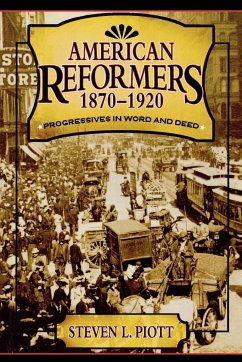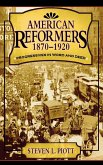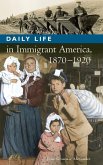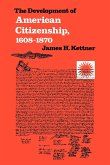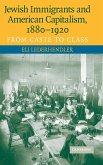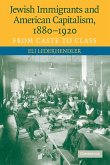In this new work, historian Steven L. Piott explores the fascinating and provocative lives of twelve influential American reformers placed in the historical context of the Gilded Age, Populist and Progressive eras. From Ida B. Wells to Louis Brandeis, Jane Addams to Charles Macune, Piott examines the diversity of ideas and approaches that characterized this dynamic period in American history.
Hinweis: Dieser Artikel kann nur an eine deutsche Lieferadresse ausgeliefert werden.
Hinweis: Dieser Artikel kann nur an eine deutsche Lieferadresse ausgeliefert werden.
Steven L. Piott's vigorous biographies of this select group of reformers, and his probing analysis of their work, illuminate the mosaic that was the Age of Reform. This volume should become a staple in college classes, but anyone interested in American history will profit from reading it. -- Christopher Gibbs, author of The Great Silent Majority: Missouri's Response to World War One American Reformers is a valuable book for students of the Gilded Age and Progressive Eras. Steven Piott brings to life the enormous challenges facing American society from 1870 to 1920 and explores solutions offered by a diverse array of intellectuals and activists who shared a common faith in humanity's innate desire to better the world. Demolishing the stereotype of Progressive Reform as the exclusive product of the urban middle-class, Piott shows that the activists who thought up the reform agenda came from all walks of American life, and if anything, were more likely to have lived on the margins of American society rather than at its affluent center. Reformers included muckraking journalist Lincoln Steffens, who got his start as a wagon train scout, and anti-lynching crusader Ida Wells who was born into slavery during the Civil War. Reform causes ran the gamut from the equitable tax system developed by itinerant printer Henry George to the campaign for international peace and human rights waged by Quaker feminist Alice Paul. Evocatively written and readily adaptable for classroom use, American Reformers uses the life stories of twelve social critics to shed light on the deep roots and broad constituency of America reform at the turn of the nineteenth century. Students new to the period as well as veteran scholars will profit by reading American Reformers. -- Frank Towers, author of The Urban South and the Coming of the Civil War Piott has authored a fine, short book. -- Ballard C. Campbell, Northeastern University The Historian In American Reformers, Steven Piott takes the reader behind the politics of reform during the period, 1870-1920, by discussing the ideas and organizations that spurred the politicians to act. He succeeds in this ambitious task by writing the biographies of twelve key individuals in the reform movement, including the father of sociology, Lester Frank Ward, Henry George, Charles Macune of Farmer's Alliance fame, Ida B. Wells, the African American woman who made the act of lynching well known, Walter Rauschenbusch, Jane Adams, Florence Kelly, Louis Brandeis, Lincoln Steffens, Harvey W. Wiley of Pure Good and Drugs legislation, John Randolph Hayes, developer of direct democracy in California, and Alice Paul, the most militant suffragette. Some of these names are familiar to students. Piott's important contribution is in putting these people together to show the complexity and far-reaching impact of the reform effort. These significant thinkers and activists provided the rationale for reform. Piott brings each of them to life and places them in the context of this exciting period of industrialization and urbanization. Few historians are as well-equipped as Piott to tackle this difficult task. His deep knowledge of this period and his ability to write clearly and succinctly makes it a pleasure to learn from this mature scholar. Teachers and students who are interested in the Populist and Progressive movements in American history will find this book indispensable. -- Lawrence O. Christensen, Curators Teaching Professor, Emeritus and Thomas Jefferson Fellow of the University of Missouri

